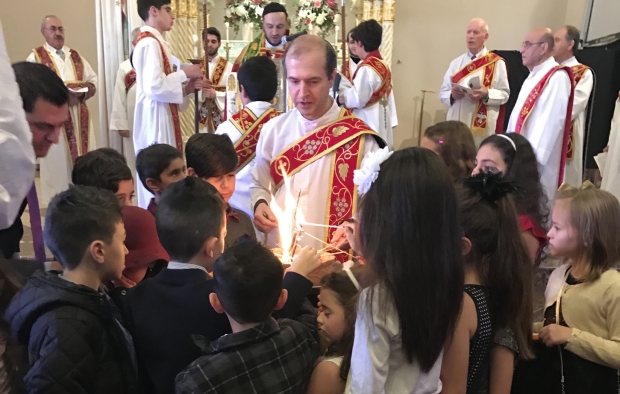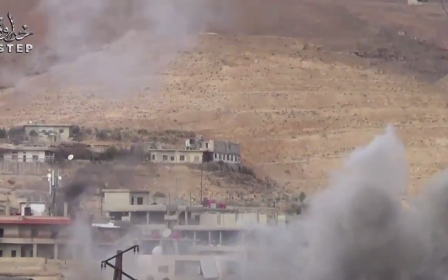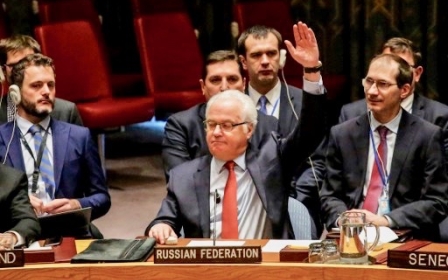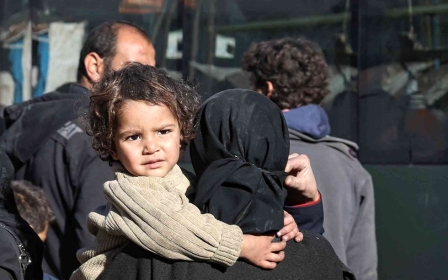Syrian and Iraqi Christians living in US reflect on their homeland
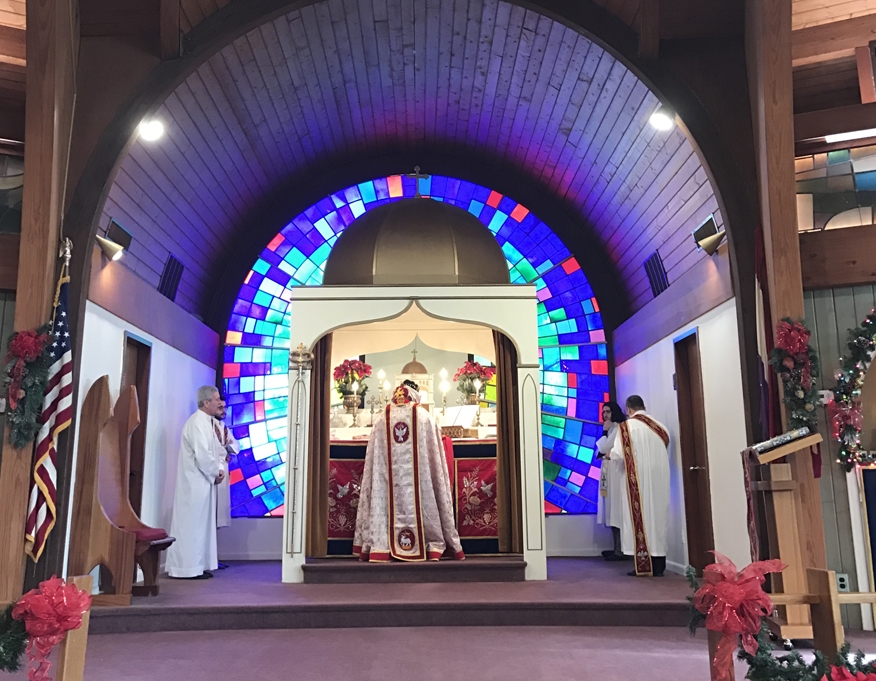
NEW JERSEY, United States - On Christmas morning, a choir sang on the second floor of a wooden church in New Jersey. But instead of singing the usual Christmas carols, the women of the choir chanted in Syriac, a dialect of Aramaic, believed to be the language spoken by Jesus Christ. At St. Mark’s Syriac Orthodox Cathedral, families from Iraq and Syria come to celebrate and remember the tragedies that have beset their homelands.
“We pray that they and all other kidnapped and abducted may return to Aleppo so that our joy of its liberation is completed,” read Bishop Johb Kawak, the Syriac Orthodox Bishop of the Northeast Diocese of America, as he led the liturgy in Syriac, Arabic and English.
Although most of the congregation lives in the United States, all of their chatter was about the region.
“We’re so excited about what’s happening in Aleppo,” said one parishioner after he wished the bishop a Merry Christmas. The church was abuzz with talks of the battle for Aleppo coming to a close. “Of course we’re happy for the victory in Aleppo. And now we pray for the city’s kidnapped bishops to be released,” said Bishop Kawak.
Christians from Iraq and Syria are divided among a number of denominations, and their traditions and how they celebrate Christmas can vary, but the main constant is their attachment to their church.
“Once any of them immigrate here, the first thing they do is find a church. From this they can establish connections,” said Martin Youmaran of the Chaldean Foundation, which helps recently arrived Iraqi Christian families resettle in the US.
“Our Christmas traditions here mainly focus on replicating traditional foods and donning our traditional garb,” Youmaran added.
In recent years, the Iraqi and Syrian Christian diaspora has swelled since as many continue to flee ongoing violence in the region. They, along with other ethnic and religious minorities, have bore the brunt of the Islamic State group’s violent takeover of vast swathes of territory in both countries. Many were forced to leave overnight, and their houses and places of worship were seized or destroyed.
Despite being a vulnerable population that has suffered immensely in the regional conflict, Christians in the Middle East are finding it difficult to seek asylum in the US.
“It wasn’t easy to come over,” said Sipya, a 19-year-old Assyrian Iraqi hailing from the Nineveh Plain village of al-Qosh, who came to the US in 2014. “I managed to get asylum because my father had received political asylum here in 2012.
“I was able to get here through a UN agency which helped me get asylum but it still took two to three years,” said S. Ghibreel, a Syriac Christian in his 50s, who came to the US three years ago from Baghdad.
“I know for Syrians it’s very tough to get visas. For Iraqis it’s a bit easier, we can go through UN agencies. They [the US] took our country, we should be allowed to come, ” Ghibreel added.
“We didn’t receive many families from Syria recently,” lamented Bishop Kawak. "It was easier for them to get asylum in Canada or Europe.”
Tough restrictions for Syrian refugees
Syrians have had a tougher time coming to the US, as the quota was set for only 10,000 Syrian refugees, which was fulfilled in August 2016. On top of the quota, Syrians have to go through a barrage of tough restrictions and processes to apply for asylum.
Currently, the process for Syrians applying to the US takes around 18-24 months and involves several government departments, including the State and Defence departments, the National Counterterrorism Center, the Department of Homeland Security and the FBI. Syrians looking for US visas have to be fingerprinted, screened medically and extensively interviewed, all of which requires several different forms of paperwork and could cost a fair amount of money.
“Unless they [Syrian families] have family sponsorship it’s very hard to get here. Many left Syria or Iraq with just a few belongings,” said a council member of St. Mark’s Syriac Church.
“They’re in a dire situation. They have little money and it’s hard for the older ones to learn the language and acclimatise to life in the America.”
George, an Aleppo native and a member of the Syriac Orthodox Church of the Virgin Mary in New Jersey, told Middle East Eye: “I worked in commerce in Syria and I had come to America before on a tourist visa. Thanks to that I was able to obtain a visa to the US a year ago and started the process of obtaining asylum here, but my wife was only able to get asylum in Canada and I cannot go visit her there.”
Samir, a member of the same congregation and an Aleppo native as well, has also faced similar hurdles.
“I was thankfully able to obtain a visa to the US. In Syria I was a civil engineer and was quite successful. I had many clients and my own office in Aleppo. Now all of that is gone and I have to start all over again and I have a wife and kids. My engineering license isn’t accepted here and now I work in construction but thankfully I am working.
“It’s a new life for me. New places, new system, different people. Back home I feel it’s Christmas,” said Sipya when asked about adjusting to life in America.
“Here I don’t feel it. In my village we are all Assyrian Christians so we celebrate Christmas together in church. Not like here. Here it’s just a break from school and same for work.”
Inability to return
Although IS is being pushed back and the war in Syria could be coming to a close, there is the growing recognition that returning is no easy option.
“At first I was wary of settling down in the US knowing it wouldn’t be easy but I lost everything I had in Aleppo. Now my kids are going to school here and are adapting. It would be tough to put them back in the Syrian system which is all in standard Arabic,” noted Samir.
“I’d love to return to Aleppo but who knows what will happen. I could be kidnapped or killed. Things won’t go back to normal there for another 10 to 15 years,” George said.
Ghibreel echoed the same sentiment. “There’s no future for me in Baghdad, it’s simply not safe.”
Middle East Eye propose une couverture et une analyse indépendantes et incomparables du Moyen-Orient, de l’Afrique du Nord et d’autres régions du monde. Pour en savoir plus sur la reprise de ce contenu et les frais qui s’appliquent, veuillez remplir ce formulaire [en anglais]. Pour en savoir plus sur MEE, cliquez ici [en anglais].


